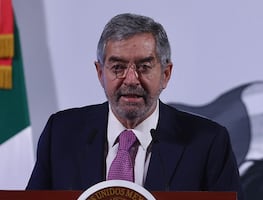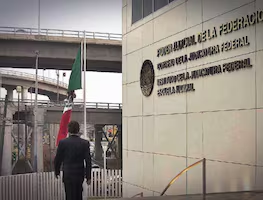Más Información

Trump desata una confrontación interna en México por declarar terroristas a los narcos; Sheinbaum acusa de “entreguismo” a oposición

Avanza repatriación a México de connacionales secuestrados por huitíes; reciben asistencia y protección consular

Canciller De la Fuente dialoga con su homóloga de Canadá, Mélanie Joly; revisan prioridades compartidas del T-MEC 2026
The world is mired in a deep social and economic crisis that has altered the priorities order due to the coronavirus pandemic ; however, once the threat is overcome, previous conflicts will resurface even stronger, sometimes aggravated by the health emergency itself.
While China is slowly finding its way out of the crisis , without reporting new cases of COVID-19 among the native population of Wuhan, the epicentre of the pandemic three months ago , and major trade centers such as Shanghai are resuming normal activities this week, countries as Spain and Italy are suffering the worst stage, having wasted-among other reasons-crucial time to prepare their societies and health systems for the impact.
Of course, the attention is increasingly focusing in the United States , where the erratic and heavily politicized response from the Trump administration is a concern for global leaders, besides exposing an inhuman and broken system that is nearing Social Darwinism with the plans to abandon basic prevention and mitigation measures by Easter, pouring billions of dollars for the bailout of Wall Street and private corporations.
Recommended:
Also, the situation in the U.S. will undoubtedly have a particular repercussion for Mexico , a country entering in the World Health Organization ( WHO ) phase two of the outbreak amid a recession and a populist government criticized by its contradictions and apparent lack of preparations.
It is within this complex framework that United Nations Secretary-General António Guterres urged world leaders to declare a “ global ceasefire ” and halt all armed conflicts in order to focus on combating the pandemic .
“It is time to put armed conflict on lockdown and focus together on the true fight of our lives. The virus does not care about nationality or ethnicity, faction or faith. It attacks all, relentlessly. Meanwhile, armed conflict rages on around the world,” Guterres said on Monday.
Next, we review some of the latent conflicts and crisis that have been relegated from public attention by the health emergency :
Syria
Joint Russian and Turkish military patrols are enforcing the latest agreement between both nations to stop the fighting in the northern Syrian province of Idlib , the scenario of a dangerous escalation after a Russian air attack killed more than 30 Turkish troops supporting islamist rebels in February.
Recommended: Serious escalation in the Syrian conflict threatens to spark a regional war
In retaliation, Ankara launched a series of drone attacks against the Syrian army, halting its advance over the last rebel stronghold in the Arab country. Turkish President Recep Tayyip Erdogan requested to no avail the intervention of the North Atlantic Treaty Organization ( NATO ) to counter the Russian air superiority, unleashing at the same time a new wave of refugees in the Greek / European Union border.
On March 5, Erdogan and Russian President Vladimir Putin held a tense meeting on Moscow , negotiating a new ceasefire; however, the Al Qaeda-linked Hayat Tahrir al-Sham group rejected the deal, is trying to close again the key M4 highway between Idlib and the Mediterranean coast and has attacked Turkish forces, in a protracted war that has killed nearly 400,000 people since 2011.
Yemen
The COVID-19 pandemic is threatening to exacerbate the world’s largest humanitarian disaster in this impoverished country, where an invasion led by Saudi Arabia and the United Arab Emirates ( UAE ) supported by the U.S. and NATO has contributed to the loss of more than 112,000 lives in the last five years.
More than 800,000 suspected cases of cholera have been reported by WHO , with nearly 2,500 deaths caused by the largest and fastest-spreading of the disease in modern history. Human Rights Watch considers that 20 million people are currently suffering from food insecurity and that 10 million are at risk of famine .
On Wednesday, the Saudi-led coalition agreed to a truce, following the acceptance of the ceasefire by the pro-Saudi faction of ousted President Abdrabbuh Mansour Hadi and the Houthi rebels that have controlled Sanaa , the Yemeni capital , since January 2015.
Iran
The Islamic Republic and Washington were at the brink of war in January, after a U.S. drone in Baghdad assassinated Major General Qassem Soleimani , head of the Iranian Quds Force , an elite military unit backing the Iraqi and Syrian governments. The Iranian reprisal consisted in bombarding the Ayn al-Asad base in Iraq with ballistic missiles, injuring 110 U.S. soldiers.
Recommended: Soleimani’s murder puts the U.S. and Iran on the brink of total war
The latest episode of 40 years of tensions between both countries was revealed this week; U.S. Secretary of State Mike Pompeo and National Security adviser Robert C. O’Brien , proposed a tough response to rocket attacks from alleged Tehran-backed militias that had killed two U.S. troops in Iraq , arguing that an Iran weakened by the coronavirus could finally accept direct bilateral negotiations.
Nevertheless, Defense Secretary Mark T. Esper and chairman of the Joint Chiefs of Staff , General Mark A. Milley , warned that an offensive could draw the U.S. into a wider war with Iran and rupture already strained relations with Baghdad . Military pressure continues; on the very day Guterres called for a global ceasefire , the Pentagon conducted war games with UAE allied forces in Abu Dhabi ’s desert region, deploying 4,000 troops.
U.S.-Russia
Talking about major war games , the COVID-19 pandemic had a positive effect last week, forcing NATO to suspend its third-largest drills in Europe since the end of the Cold War . The Defender 2020 exercise included 20,000 U.S. and allied troops who were meant to be deployed across 10 European countries, showing that bipolar tensions are well and alive in spite of the supposed Russian “control” of Trump claimed by the Democrats since 2016.
The outbreak has also exhibited the uselessness of NATO and the European Union in terms of helping its members—especially Italy and Spain —during times of civil convulsion, in contrast with the medical aid sent to Rome by the former members of the communist bloc, Russia , China , Cuba , and even Venezuela .
As we have pointed out, the “ authoritarian ” countries are winning in this crisis the world’s hearts and minds over the clumsy and insufficient response from the “ democracies ”. However, the “ transatlantic bond ” and the arms race are still strong (just before coronavirus hit NATO announced is increasing military spending by USD $400 billion , excluding the U.S.), and Italy reopened its F-35 fighter jet final assembly plant, as part of the 2012 deal with Lockheed Martin to buy 90 planes.
For its part, Great Britain is planning to spend GBP £350 billion over the next decade for weapons such as nuclear-armed submarines, aircraft carriers and combat aircraft. These spending commitments are being made—stressed Declassified UK —when its National Health Service “lacks a range of basic equipment and staff to test and treat coronavirus cases, and to address” other health challenges.
U.S.-China
The ability of the two giants to reconcile and cooperate will be crucial in the next years to address the post-pandemic global environment and related pressing challenges such as new diseases , climate change , development , and extreme poverty .
Unfortunately, the current planetary emergency is a reflection of the competition for preeminence between the U.S., still opposed to Beijing ’s rise based on cooperation and multilateralism , and the Chinese model that will be very difficult to replicate in other cultures.
It is not surprising, for example that the U.S. tried to include the phrase “ Wuhan virus ” in the joint statement of the foreign ministers from the G-7 group, when China is emerging stronger thanks to its previous progress in Artificial Intelligence ( AI ), 5G technology , and large investments in public health applications.
“Combining capability with massive amounts of coronavirus test data gave China a decisive advantage in epidemic control. This may be the largest and most sophisticated Artificial Intelligence experiment ever, and it may well establish China as the world dominant AI power ,” summarizes Spengler in Asia Times . The pandemic , adds the columnist, “may denote the ascendancy of Asia and the decline of the West .”
Editing by Sofía Danis
More by Gabriel Moyssen







